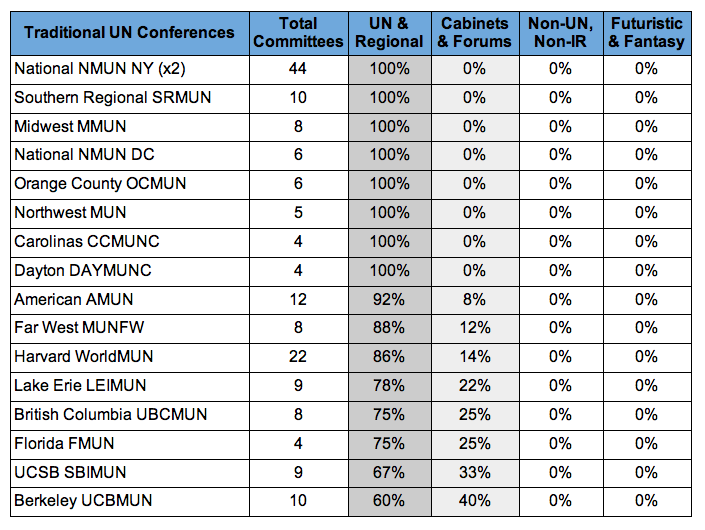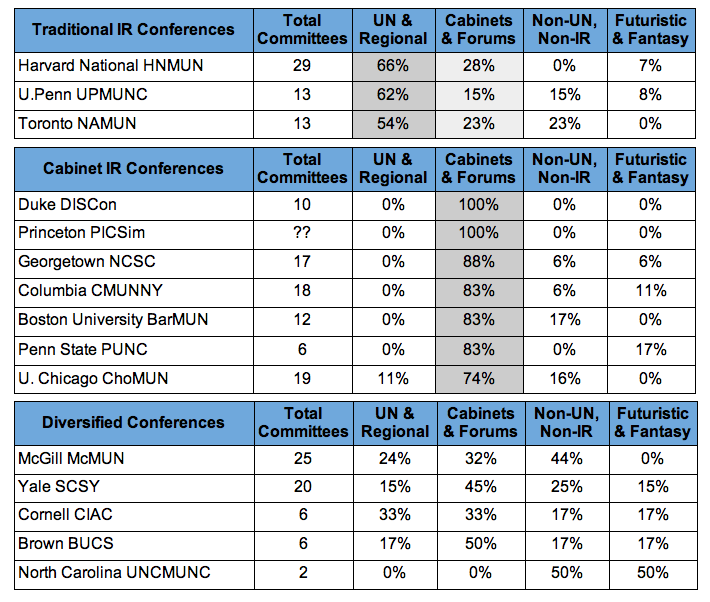The college Model UN landscape has evolved into two very different circuits with differing philosophies on how Model UN should be simulated. Recent discussion on the preseason college rankings article highlighted a key difference between the two college circuits: the simulation of non-United Nations committees including those that are fictitious or futuristic. Think Lord of the Rings. Harry Potter. 24. Paradise Lost.
This is an issue for both circuits. We have heard from many delegates among the World Division schools (those who attend NCSC, SCSY, etc.) and from an infamous YouTube video that some of these fantasy crisis committees have gotten out of hand — they may still teach group negotiation and decision-making skills and may be fun but the committees are not substantively valuable or academically rigorous. Many International Division schools and conferences (NMUN, etc.) do not support the simulation of non-United Nations committees at all and believe Model United Nations conferences should only simulate United Nations bodies and affiliated organizations.
Have these so-called fantasy committees gotten out of hand?
We analyzed the committee types for all the 2011-12 North American college conferences that have published their committee lineups as of September 28, 2011, and sorted conferences by the percentage of each type that they simulate. There are four types of committees:
- UN & Regional: present or historical UN committees and other international and regional organizations. Examples: General Assembly, ECOSOC, Security Council, European Union.
- Cabinets & Forums: present or historical cabinets, forums, and national organizations that address public policy or international relations. Examples: French Cabinet, Chinese Communist Party, US Senate. We included Press Corps into this group.
- Non-UN, Non-IR: present or historical decision-making organizations that may influence but do not primarily focus on international relations or public policy. Examples: Facebook Board of Directors, FIFA, NYPD Leadership Council.
- Futuristic & Fantasy: any committee that requires an element of fictitiousness regardless if they are related to international relations or not. Examples: Lord of the Rings, Trial of Kim Jong-Il, the West Wing, India-Pakistan 2013 (or any year beyond the 2011-12 school year).
For many participants in the International Division, the answer would be yes. Model UN should be about the United Nations, and there are plenty of conferences that keep this philosophy true. Half of all the 2011-12 North American college conferences in Model UN still simulate traditional UN committees or a combination of UN committees and other public policy and international relations-related cabinets & forums:
Almost all of these conferences fall under the International Division (Harvard WorldMUN and Berkeley UCBMUN are exceptions as they are usually associated more with the World Division). But overall, delegates in this division have many conferences to choose from and those who attend these conferences will never encounter any fantasy committees or even any real-life organizations that are not necessarily related to international relations (e.g. FIFA or Apple Board of Directors). Therefore, they can either focus on maintaining the UN-only characteristic of their existing Model UN conferences or criticize the other half of the circuit in favor of reform toward UN-only or IR-only conferences.
–
For participants in the World Division, the consensus answer is more difficult to ascertain. Model UN can be about the United Nations, policy-making cabinets, or a simulation of any type of real or fictitious organization that is known to mankind. Another half of the 2011-12 North American college conferences include committees that are non-UN or non-international relations into their committee lineup, and this illustrates a huge demand for committees that are not within the traditional Model UN realm. Here we have divided the World Division conferences into three categories: Traditional IR (mostly UN & regional committees and cabinets), Cabinet IR (mostly cabinets and forums), and Diversified (a mix of different types with no type comprising over 50% of the lineup).
There’s a healthy mix of different types of conferences to attend and most conferences are predominantly related to international relations. None of the conferences focus on the fictitious, futuristic, or fantasy committees. In fact, these type of committees only make up a total of 6% of all committees in the World Division conferences so few delegates will ever get a chance to experience them.
So why all the outrage? Is it because fantasy committees should not have a place in Model UN? Or is it because there are issues in terms of the quality or quantity of them at a Model UN conference? If it’s the latter, is reform still necessary?
There are probably several points of view from most conservative (anti-fantasy) to most liberal (pro-fantasy):
Model UN should not have any fantasy committees (or even non-IR related committees). This would probably be argued by traditionalists who want Model UN to be only about Model UN — only United Nations bodies should be simulated.
There should be a minimum number or percentage of United Nations committees to qualify as a Model UN conference. This would probably be argued by traditionalists who want Model UN to still be mostly about Model UN but understand there is value and interest in non-UN committees. They may not want their conferences to look like NMUN but they are fine with a minority lineup of other types of committees like the ones HNMUN and UPMUNC have. A more liberal version of this policy would be to have a minimum number or percentage of any type of international relations focused committees (i.e. UN committees + cabinets).
There should be a maximum number or percentage of fantasy and futuristic committees that a conference can be allowed to simulate. This would probably be argued by those who don’t see the current state of Model UN to be a big issue but want to make sure that fantasy committees do not get out of hand and water down the international relations focus or present issues focus of the conferences. A more conservative version of this policy would be to have a maximum number or percentage of fantasy & futuristic committees as well as non-UN, non-IR committees.
Conferences can choose their lineups but fantasy committees should have some type of standards. This would probably be argued by those who enjoy fantasy committees and think they are acceptable simulations to teach leadership skills but just want to ensure that there is some level of quality when fictitious elements are built into the background guides and crisis scenarios.
–
Ultimately, this is an issue for college conference leaders and head delegates to discuss and decide.
Do you think there should be standards on committee lineups for Model UN conferences? Do fantasy committees require some type of reform? Or is the circuit actually fine and a minority of people are just making a huge fuss against committees that they rarely even get to attend?




